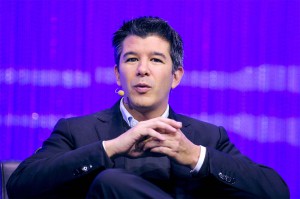
Another tough day for Uber CEO Travis Kalanick as the company's recently hired president, Jeff Jones, resigned.
The old adage says when it rains, it pours and if you’re Uber CEO Travis Kalanick, it must feel like a hurricane is swirling around your office. The San Francisco-based ride services company suffered another setback over the weekend as Jeff Jones, the company’s recently hired president, resigned.
His departure is just the latest in snafus that have plagued the company, harming its perception with consumers and investors alike. Ironically, Jones, who came over after a stint at mega-retailer Target, came on board to improve Uber’s reputation.
He quit less than seven months after he joined the company. The reasons for his departure weren’t immediately announced; however, in an email to employees Kalanick praised Jones for his work and dropped a pretty big hint as to why Jones left.
“In 6 months, he made an important impact on the company—from his focus on being driver obsessed to delivering our first brand reputation study, which will help set our course in the coming months and year,” he wrote.
(Uber hires former U.S. Attorney General to investigate harassment claims. Click Here for the story.)
“After we announced our intention to hire a COO, Jeff came to the tough decision that he doesn’t see his future at Uber.”
This is just one more issue the company’s had to weather. Most recently, there was the bad publicity the company received from dashcam video released by Bloomberg showing Kalanick arguing with an Uber driver about a recent rate cut for drivers, after which the embattled CEO apologized and said he would seek out assistance to improve his managerial skills.
Add that to the employee blog that essentially described the work environment at the company as a misogynistic frat house, causing Kalanick to bring in former Attorney General Eric Holder to come in and investigate claims of sexual harassment that went unchecked. There have been a litany of other problems too in the last 12 months that have caused investors to worry and ridership to drop.
On top of that Jones is just the tip of the iceberg when it comes to executive departures.
(Waymo sues Uber for theft of intellectual property. Click Here for the story.)
Last month, engineering executive Amit Singhal was asked to resign after a sexual harassment allegation was levied at him from his previous job at Google. Additionally, Ed Baker, Uber’s vice president of product and growth, and Charlie Miller, Uber’s top security researcher, also left the company.
In December, the ride-sharing service launched an autonomous vehicle test program in San Francisco but refused to apply for the necessary state permit. It subsequently pulled out of the pilot project when the California Department of Motor Vehicles threatened to have the effort shut down, Uber moving the self-driving Volvo XC90s to Arizona.
Then, in January, it came under fire by those who opposed CEO Kalanick’s decision to join President Donald Trump’s economic advisory council. That flare-up intensified when Uber was accused of taking steps to profit from a New York City cab boycott called in response to Trump’s immigration ban.
(Uber CEO Kalanick seeking “leadership help” after tantrum goes viral. Click Here for the story.)
Uber subsequently issued a statement opposing the so-called “Muslim Ban,” and Kalanick quit the advisory board, but not before thousands of customers reportedly quit the service.
